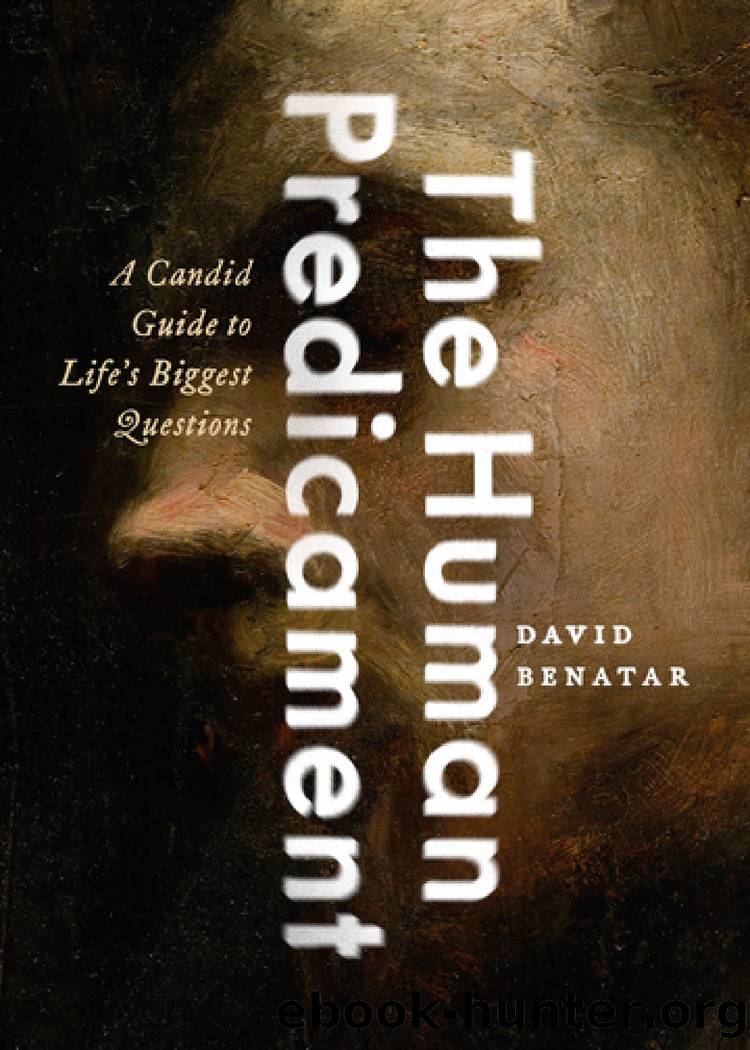The Human Predicament_Life Without Illusions by David Benatar

Author:David Benatar [Benatar, David]
Language: eng
Format: epub
Tags: Philosophy
ISBN: 9780190633813
Google: -s6dDgAAQBAJ
Amazon: 0190633816
Goodreads: 32335759
Publisher: Oxford University Press
Published: 2017-06-07T00:00:00+00:00
* This is by far the longest chapter in the book. Those who prefer a shorter reading should consult âA Readerâs Guideâ at the beginning of the book for suggestions of what may be skipped.
6 | Immortality
I do not want to dieâno; I neither want to die nor do I want to want to die; I want to live for ever and ever and ever. I want this âIâ to liveâthis poor âIâ that I am and that I feel myself to be here and now, and therefore the problem of the duration of my soul, of my own soul, tortures me.
âMIGUEL DE UNAMUNO
The Tragic Sense of Life (Collins, Fontana Library, 1962), 60
Death is bad, but it does not follow from this that being immortal would be good. It is possible that death is bad, but that eternal life would be worse. Thus, we need to ask whether the human predicament would be meliorated or whether it would be exacerbated if we were immortal. The view that immortality would be worse than living for a limited time is one of two broad kinds of optimistic responses to the problem of mortality (that is, one of two ways of rejecting the view that our mortality is part of our predicament). The other kind of optimistic response is to deny, one way or another, that we are (or must remain) mortal.
Delusions and fantasies of immortality
Consider, first, the denial of our mortality. One form this takes is belief in physical resurrection at some future time. If this belief were true, it would make death a kind of suspended animation rather than annihilation. Assuming that the resurrected person would either not die a second time or would be endlessly resurrected after future deaths, this promises a kind of immortality.
Perhaps more common is the belief in an immortal soul. The comfort sought here is that though our bodies may die, we shall continue in someâpreferably blissfulâdisembodied state despite our corporeal death and decay.
Such beliefs are instances of wishful thinking. We have no evidence that we shall ever be physically resurrected or that we shall endure as disembodied souls after our physical deaths. Religious texts may speak of these phenomena, but even when they are not waxing poetic and metaphorical, they do not constitute evidence. Indeed, it is much more reasonable to believe that death is annihilation of the self.
Are we really to believe that decomposed, cremated, atomically incinerated, and ingested bodies are to be reconstituted and reanimated? The challenges in understanding the mechanics of this dwarf even other notable problems, such as the logistics of physically accommodating all the resurrected.
These practical problems do not confront the belief in an immortal soul, but that belief faces no shortage of other problems. We have plenty of evidence that our consciousness is a product of our brains. When we are given general anesthesiaâadministered to our physical bodies and affecting our physical brainsâwe lose consciousness. When our brains are deprived of oxygen or when we suffer a sufficiently powerful blow to the head, we similarly lose consciousness.
Download
This site does not store any files on its server. We only index and link to content provided by other sites. Please contact the content providers to delete copyright contents if any and email us, we'll remove relevant links or contents immediately.
| Deconstruction | Existentialism |
| Humanism | Phenomenology |
| Pragmatism | Rationalism |
| Structuralism | Transcendentalism |
| Utilitarianism |
The remains of the day by Kazuo Ishiguro(8961)
Tools of Titans by Timothy Ferriss(8357)
Giovanni's Room by James Baldwin(7313)
The Black Swan by Nassim Nicholas Taleb(7095)
Inner Engineering: A Yogi's Guide to Joy by Sadhguru(6780)
The Way of Zen by Alan W. Watts(6587)
Asking the Right Questions: A Guide to Critical Thinking by M. Neil Browne & Stuart M. Keeley(5747)
The Power of Now: A Guide to Spiritual Enlightenment by Eckhart Tolle(5738)
The Six Wives Of Henry VIII (WOMEN IN HISTORY) by Fraser Antonia(5492)
Astrophysics for People in a Hurry by Neil DeGrasse Tyson(5172)
Housekeeping by Marilynne Robinson(4429)
12 Rules for Life by Jordan B. Peterson(4297)
Double Down (Diary of a Wimpy Kid Book 11) by Jeff Kinney(4257)
The Ethical Slut by Janet W. Hardy(4235)
Skin in the Game by Nassim Nicholas Taleb(4229)
Ikigai by Héctor García & Francesc Miralles(4228)
The Art of Happiness by The Dalai Lama(4118)
Skin in the Game: Hidden Asymmetries in Daily Life by Nassim Nicholas Taleb(3983)
Walking by Henry David Thoreau(3946)
